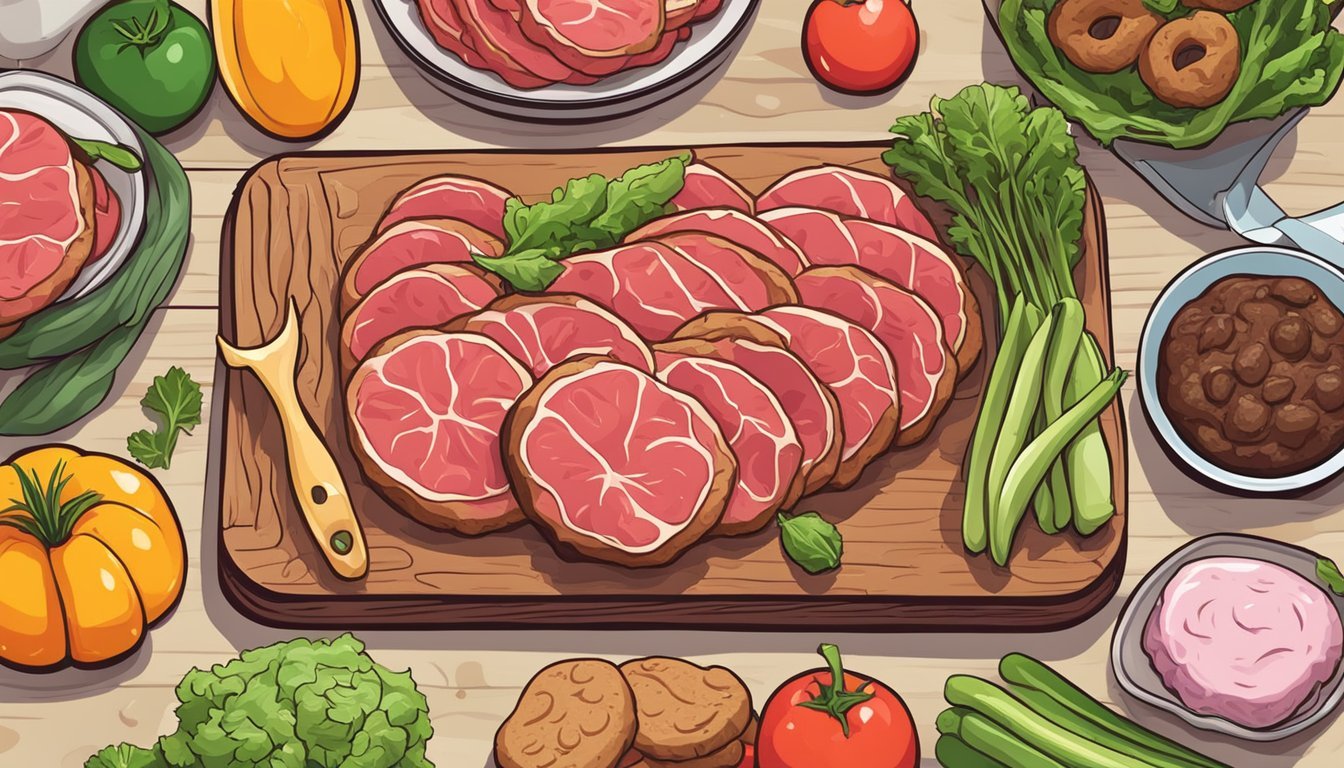Carnivore Diet vs. The Cookie Diet
Comparing Nutritional Value and Weight Loss Strategies
In recent years, dietary trends have veered from traditional balanced eating to more unconventional and restrictive regimes, often with the promise of rapid weight loss and improved health outcomes. Among these, the carnivore diet and the cookie diet stand in stark contrast to standard dietary advice and to each other. The carnivore diet promotes a high intake of animal-based foods, excluding plant products altogether, while the cookie diet, albeit less extreme, suggests a low-calorie approach emphasizing specially-formulated cookies to replace meals, often resulting in a drastic reduction in overall calorie and nutrient intake.
The carnivore diet, which consists solely of animal products like meat, fish, eggs, and some dairy, is rooted in the belief that human bodies are better suited to a high-protein, low-carbohydrate diet that mimics the eating patterns of ancient ancestors. Proponents claim benefits such as weight loss, enhanced mood, and reduced inflammation, although the diet's restrictive nature brings its own set of challenges and potential nutritional deficiencies. On the flip side, the cookie diet offers a more convenient, though unconventional, method of calorie control by having individuals consume nutrient-enriched cookies alongside a single meal, aiming to simplify the weight loss process without the need for complex meal planning.
Comparing these two diets sheds light on the broader spectrum of modern dietary practices and their implications for health. It highlights the need for a critical assessment of the scientific evidence supporting such diets, the potential risks and benefits, and the importance of personalized approaches to nutrition that take into account individual health profiles, goals, and sustainability over the long term.
Conceptual Overview of Diets
The Carnivore Diet and the Cookie Diet embody two unconventional eating approaches that diverge from typical balanced diets. Here, the focus will be on a nutritional analysis and how these diets align with weight loss and health benefits.
The Carnivore Diet is characterized by its exclusion of plant-based foods, zeroing in on an all-animal-product menu. It typically includes:
High-protein: meats, fish, and eggs
High-fat: animal fats and dairy products
Low-carb: negligible amounts of carbohydrates
Nutrients: This diet has raised concerns over nutrient deficiencies due to the lack of fruits, vegetables, and grains. It does, however, supply ample protein and fats.
The Cookie Diet, contrastingly, involves consuming specially-formulated cookies designed to promote weight loss through portion control and calorie restriction. These cookies are usually:
Low-calorie: designed to replace meals
High in fiber: to enhance satiety
Supplemented with vitamins: to meet nutritional needs
Balance: The Cookie Diet, while convenient, may not provide a sustainable source of all essential nutrients and is considered a fad diet due to its restrictive nature.
Both diets have been touted for their weight loss benefits, due to their low-carb (Carnivore) or low-calorie (Cookie) nature. However, long-term health impacts require careful consideration, as sustainability and comprehensive nutritional needs must be addressed to maintain overall health.
Carnivore Diet Explained
The Carnivore Diet, revolving around all-meat food intake, prioritizes animal products while eliminating other food groups. It's known for being high-protein, high-fat, and zero-carb.
Foundations of the Carnivore Diet
The Carnivore Diet is a regimen that consists entirely of animal products, predominantly meat. Foundations of this diet include:
Red Meat: Considered the cornerstone, beef and lamb are staple foods.
Other Meats: Includes poultry, pork, and game.
Seafood: Fish and shellfish add variety and nutrients.
Eggs: Highly valued for their protein and versatility.
Organ Meats: Liver and other organ meats provide a range of essential vitamins and minerals.
Fat Sources: Animal fats, such as butter and tallow, are encouraged for cooking and enhancing flavor.
Dairy: Some variations allow moderate intake of high-fat dairy products.
Benefits of an All-Meat Regimen
Potential health benefits of the Carnivore Diet might include:
Weight Loss: Due to low-carb and ketosis-inducing nature, it can promote weight loss.
Mental Health: Some anecdotal reports suggest improved focus and mood stability.
Simplicity: It offers an easy-to-follow diet without complex meal planning.
It's essential to note that these benefits are largely anecdotal or based on individual experiences.
Potential Risks and Considerations
While the Carnivore Diet may offer benefits for some, there are significant health risks and considerations:
Saturated Fat: High intake of saturated fat from animal products may elevate LDL cholesterol, posing a risk for heart disease.
Nutrient Deficiencies: Exclusive meat consumption risks deficiency in fiber, vitamins, and minerals found in plants.
Long-Term Health Effects: The long-term effects of an all-meat diet are largely unknown and potentially harmful.
Individuals considering this diet should consult with healthcare providers and weigh the potential risks against any benefits.
The Cookie Diet Breakdown
The Cookie Diet is a weight management program that incorporates specially formulated cookies as a primary energy source for weight loss. It's designed to promote quick results through a restrictive, low-calorie diet that centers around these commercial cookies.
Cookie Diet Basics
The basis of the Cookie Diet is the consumption of low-calorie cookies made with a blend of proteins that aim to decrease hunger and calorie intake. Typically, these cookies include a mix of:
Protein sources (amino acids)
Fiber, to aid digestive health
Some form of sugar
A limited amount of grains
These cookies are not typical sweet treats found in a bakery but are processed food items that are part of a controlled diet plan designed to replace entire meals. Users generally eat cookies during the day, followed by a traditional dinner.
Efficacy and Success Stories
Reports on the Cookie Diet suggest that it can lead to rapid weight loss primarily due to the low daily intake of calories, which often totals around 1,000 calories per day. Stories of individuals successfully losing weight, especially in the short term, highlight the potential benefits of the diet. However, like with any fad diet, results vary and may not be sustainable in the long term.
Challenges and Criticisms
Critics argue that the Cookie Diet is excessively restrictive and lacks essential nutrients, resulting in the following challenges:
Limited intake of vitamins and minerals naturally found in varied diets.
Potential fiber deficit since the diet is low in whole grains.
Increased risk of consuming too much sugar, depending upon the cookie recipe.
Overreliance on carbohydrates from processed foods while excluding other food groups.
Due to these reasons, many nutrition experts question the long-term viability and health implications of the Cookie Diet as a weight management strategy.
Nutritional Profile Comparison
When comparing the Carnivore and Cookie Diets, it is crucial to understand how they differ in nutrient profiling, including the balance of macro and micronutrients they offer as well as the vitamins and minerals provided.
Micro and Macronutrients in Focus
Carnivore Diet: This diet consists primarily of animal products, including meats, seafood, and sometimes dairy and eggs. It is high in proteins and fats, particularly saturated fat, and contains almost no carbohydrates. The absence of plant foods means it typically lacks fiber, which is essential for digestive health.
Cookie Diet: Typically, this diet comprises specially formulated cookies that are designed to replace meals and control calorie intake, alongside a dinner that may include lean protein and vegetables. The cookies provide a blend of protein, carbohydrates, and fat, often with added fiber to promote satiety.
Vitamins and Minerals
Carnivore Diet: Those following a carnivore diet may receive abundant amounts of certain minerals such as iron and zinc, typically found in red meat. However, without plant foods, individuals may lack other essential nutrients like vitamins C and E, potassium, and folate.
Cookie Diet: The diet's cookies are sometimes enriched with vitamins and minerals to prevent deficiencies. Nevertheless, the limited variety of food can lead to an inadequate intake of essential nutrients found in whole foods, such as magnesium found in nuts and seeds or vitamin D present in dairy and fatty fish.
Balancing Macronutrient Intake
A well-rounded diet requires a balance of macronutrients - proteins, fats, and carbohydrates - tailored to individual health goals and needs.
Carnivore Diet: Provides a high protein and fat intake with virtually no carbs, which may support weight loss but can lead to imbalances and potentially increased risks of heart disease due to high saturated fat.
Cookie Diet: The macronutrient balance is controlled by the cookie formula, designed to promote weight loss through calorie restriction. The inclusion of a sensible dinner may help mitigate nutrient deficits, but it's crucial to ensure that this meal provides a variety of vegetables, whole grains, and lean proteins for a balanced nutrient intake.
Health Implications and Medical Concerns
Evaluating the unconventional Carnivore and Cookie diets raises important questions about their health implications, specifically regarding obesity, diabetes, heart disease, and chronic conditions. This section discusses the impacts on health and potential medical concerns associated with these diets.
Impact on Obesity, Diabetes, and Heart Disease
The Carnivore diet, being high in protein and fat, can influence obesity and type 2 diabetes management by potentially reducing appetite and stabilizing blood sugar levels. However, the absence of plant-based fiber may have negative effects on digestive health, essential for weight management. Meanwhile, the Cookie diet, generally high in refined carbohydrates, may contribute to weight gain and erratic blood sugar control, increasing the risk for both obesity and diabetes.
Concerning heart disease, the Carnivore diet's saturated fat content could elevate LDL cholesterol, heightening heart disease risk. In contrast, certain Cookie diets may have lower saturated fat but still contribute to heart disease due to high sugar content leading to increased blood pressure and inflammation.
Association with Chronic Diseases
Both diets pose potential risks for various chronic diseases. The consistency of animal protein in the Carnivore diet may be associated with a higher risk of certain cancers, including colon cancer. The diet's lack of diversity also might exacerbate autoimmune conditions through imbalanced immune responses.
Conversely, the Cookie diet's high sugar and refined flour could increase the likelihood of inflammatory conditions, such as arthritis, and impact chronic illnesses by fostering an environment of persistent inflammation. The long-term health benefits of both diets are unclear, and additional studies are required to establish their roles in cancer prevention or causation.
Digestive Health and Common Illnesses
The Carnivore diet, devoid of plant-based foods, could lead to digestive issues such as constipation or an increased risk of irritable bowel syndrome (IBS) due to a lack of dietary fiber. On the other hand, the Cookie diet may cause similar digestive issues from high sugar and low fiber intake.
The exclusion of certain food groups in both diets may also impair the body's ability to fight common illnesses by compromising nutrient diversity essential for a robust immune system. The need for a balanced diet to prevent such health issues is generally well-documented.
Detractor and Advocate Perspectives
The carnivore and cookie diets have sparked intense debate. Advocates claim significant health benefits, while detractors warn of potential risks. The contrast between these diets underscores the diversity of dietary trends.
Medical Community Insights
Joe Rogan popularized the carnivore diet, reporting benefits for autoimmune conditions. The medical community, including registered dietitians and healthcare providers, however, express concern. They highlight the lack of plant-based nutrients and potential for increased cholesterol and heart disease risk. The diets are rarely endorsed by nutrition professionals, with concerns centered around long-term sustainability and nutritional completeness.
Cultural and Celebrity Endorsements
Both diets gained traction through celebrity endorsements. Rogan's experience, in particular, has influenced his substantial fan base, contributing to the cult following of the carnivore diet. Conversely, cookie diets often lure with the promise of enjoying sweets while losing weight. These endorsements can overshadow critical evaluation, leading some to adopt these trends without consulting healthcare professionals.
Public Perception and Skepticism
The public perception of these diets varies widely. Some view them as revolutionary, while others approach with skepticism. Social media has played a pivotal role in shaping opinions, with hashtags and personal testimonials creating more believers or skeptics. The divisive nature of dietary trends is apparent in online communities, where anecdotal success stories clash with calls for scientifically-researched diet plans.
Practical Considerations and Adjustments
Adapting to either the Carnivore Diet or the Cookie Diet requires careful planning and understanding of each diet’s demands and flexibility. Individuals should consider how these diets fit into their lifestyle, potential for customization, and strategies for smooth transition and adaptation.
Incorporating Diet into Lifestyle
Both the Carnivore Diet and Cookie Diet represent significant shifts from a traditional balanced diet and may require considerable lifestyle changes. For the Carnivore Diet, individuals must be prepared for a regimen centered around meats like steak, organ meat, bacon, ground beef, and fish, as well as full-fat dairy products. On the other hand, the Cookie Diet entails a primarily low-calorie, meal-replacement approach with a focus on specific cookies designed to aid in weight loss. Ensuring access to the appropriate foods is essential for maintaining these diets long term.
Carnivore Diet:
Breakfast: Scrambled eggs and bacon; possibly a small steak
Lunch: Chicken breasts with cheddar cheese; salmon
Dinner: Organ meat dish; pork chops (What wine goes well with pork chops?) with butter
Cookie Diet:
Special diet cookies as meal replacements throughout the day
Limited additional food items as specified by the diet plan
Customization and Flexibility
Customization of these diets to meet personal preferences or nutritional needs is limited. The Carnivore Diet is an elimination diet that strictly excludes plant-based foods, thereby offering little room for flexibility. However, within the animal-based food groups, individuals may choose from various meats and dairy products to prevent monotony. The Cookie Diet, predominantly premised on specific cookies, allows for some flexibility with one main meal a day, which may include a lean protein source and non-starchy vegetables.
Transition and Adaptation Strategies
Transitioning to either diet can be challenging and may lead to temporary discomfort as the body adapts. For the Carnivore Diet, the initial phase might involve increased feelings of inflammation or a need for dietary adjustments to balance fat and protein intake. Some individuals might have to modify their medication under medical supervision due to changes in dietary fat. For the Cookie Diet, adaptation often requires overcoming hunger pangs and ensuring one does not consume excess calories during the main meal of the day. Adequate hydration and a gradual shift can alleviate some of the transition effects.
Carnivore Diet Tips:
Gradually increase intake of meats and full-fat dairy while reducing other foods
Monitor health markers regularly
Cookie Diet Tips:
Methodically replace meals with cookies while maintaining calorie awareness
Maintain hydration and consider adding fiber supplements to mitigate potential gastrointestinal issues
Long-term Sustainability and Environmental Impact
This section discusses the longevity and ecological effects of the Carnivore and Cookie Diets, emphasizing their feasibility and potential strain on resources.
Sustainability of Diet Choices
The Carnivore Diet exclusively consists of animal products, demanding extensive quantities of meat. In practical terms, this diet could lead to nutrient deficiencies without careful planning, as plant foods provide essential vitamins and minerals. Sustainability of the Carnivore Diet is scrutinized due to high water usage and the significant demand placed on livestock production.
On the other hand, the Cookie Diet, featuring calorie-controlled processed foods, chiefly cookies, is not designed for long-term application. Its high reliance on processed meat and other manufactured foods raises questions about the sustainability of such eating habits, as the production of these foods can be resource-heavy and less nutritionally rounded compared to whole food diets.
Animal Agriculture: Requires large water inputs and land resources.
Processed Foods: Energy-intensive manufacturing and packaging.
Environmental Considerations
The environmental impact of the Carnivore Diet is palpable when examining the existing agricultural practices necessary to sustain it. Livestock farming contributes to deforestation, habitat destruction, and loss of biodiversity, with an expansive carbon and water footprint.
Conversely, the Cookie Diet, while not primarily focused on meat, typically involves high amounts of sugar and fat, with a considerable proportion of ingredients originating from intensive agricultural practices. The environmental cost of processing and packaging these diets is also notable.
Biodiversity: Animal farming implicated in species loss.
Carbon Footprint: Agricultural practices tied to climate change.
Conclusion
When evaluating the Carnivore Diet and the Cookie Diet, individuals must consider potential nutrient deficiencies and health risks associated with restricting dietary variety. The Carnivore Diet, which focuses solely on animal products, runs the risk of omitting essential nutrients typically obtained from plant-based foods, such as fiber, vitamins, and certain antioxidants. Conversely, the Cookie Diet, while offering convenience, often lacks adequate protein and essential fats, leading to possible nutrient imbalances.
Regarding long-term health, neither diet may provide sustainable health outcomes due to their restrictive nature. Dietary choices should ideally be diverse and balanced to support a broad spectrum of bodily functions and promote overall well-being. Personal health goals are crucial in guiding one's decision; however, any diet that severely limits the intake of specific food groups warrants careful consideration and possibly medical supervision.
It is recommended that individuals tailor their diet to their unique health requirements, and if one opts for such unconventional diets, working with a healthcare provider to monitor health markers is advisable. Here are some potential benefits and risks to consider:
Carnivore Diet
Benefits: May simplify meal planning, improve satiety, and possibly aid in certain digestive issues.
Risks: Risk of certain cancers, heart disease, and nutrient deficiencies without proper supplementation.
Cookie Diet
Benefits: Portion control and convenience.
Risks: Insufficient nutrient intake, unstable blood sugar levels, and potential for weight regain.
Both diets embody extreme measures in eating patterns and, while they might yield short-term results, could lead to adverse effects if followed long-term. Tailored, well-rounded dietary choices based on medical guidance and scientific evidence are more likely to support healthful living.










